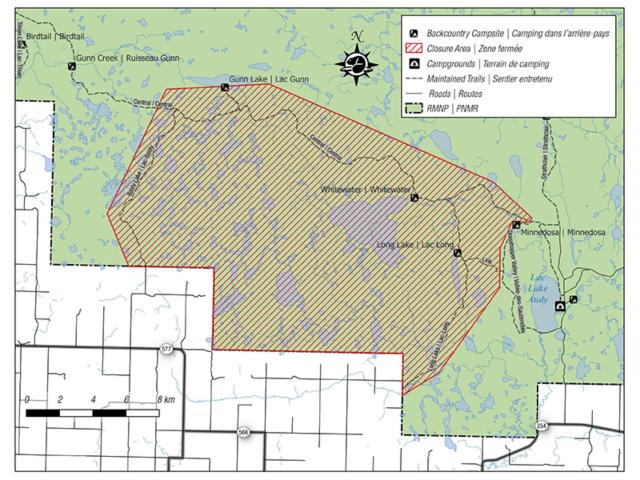 NewsNow
NewsNow
Two Gilbert Plains residents have been recognized with Manitoba Healthy Aging awards.
Bruce Jorgenson was presented with an Older Adult of the Year award, which recognizes Manitobans 65 and older for demonstrating leadership in advocating for health care services.
Meanwhile Jose Randell received a Healthy and Active Living Ambassador award, which recognizes those 65 and older that actively contribite to helping older adults stay physically active.
- Details
- Contributed by Jeff Henson
The first responders of the Carberry Bus Crash have been honoured for their service today with the Order of the Buffalo Hunt.
Premier Wab Kinew awarded 134 first responders with one of Manitoba's highest honours today.
First responders from the Carberry North Cypress-Langford Fire Department, Brandon Fire and Emergency Services, Neepawa Volunteer Fire Department, Shared Health Emergency Response Services, STARS air ambulance, and Manitoba RCMP, as well as provincial call takers and dispatchers, were inducted.
There were also inductees from Saskatchewan who flew in for assistance.
Premier Kinew said, “We want to honour those whose valour and heroism helped to embody the best of Manitobans.”
- Details
- Contributed by Jeff Henson
A Christmas-time Rotary fundraiser is rapidly approaching.
The annual Gifts of Light campaign traditionally takes place in December, in partnership with Pathways Funeral Home.
Rotarian Kara Vanderheyden says it allows people to pay tribute in memory of a lost loved one.
"The idea is to essentially light up C-N Park with beautiful, live Christmas trees. Individuals and families or groups of people who have lost a loved one in the past can purchase a Christmas tree, which the Rotary Club then sets up and puts lights on it and sets it up in C-N Park."
Vanderheyden adds they usually have around 40-50 trees lit up in CN Park every year.
If you are interested in purchasing a tree in memory of a loved one, you can contact Pathways, or the Rotary Club of Dauphin through their social media platforms.
- Details
- Contributed by Jeff Henson
Parks Canada Has released information on a series of controlled burns that will be taking place over the next several weeks In Riding Mountain National Park.
This will see several trail and day-use area closures.
The Central Trail between Long Lake Junction and Baldy Lake Junction, the Baldy Lake trail, Gunn Lake Trail, and Long Lake Trails.
Campsites at Whitewater, Gunn Lake, and Long Lake will also be closed during this operation.
Prescribed Fires remove fuel that could cause out-of-control wildfires in a controlled fashion, and often take years of planning and assessment.
These fires will mostly be on the southern side of the park in areas west of Minnedosa, and smoke will likely be visible in a very wide radius.
- Details
- Contributed by Michael Brossart
In the courts this past week, a former Romanian Orthodox priest, charged in connection with a historical sexual assault in the Russell area that dates back to the early 1970's had a new date set for his matters.
81-year-old Constantin Turcoane had his matters adjourned to November 27.
And a 23-year-old man from Sandy Bay First Nation was also back in court this past week in relation to the discharge of a firearm in early August on the Ebb & Flow First nation.
Billy Roulette had his case adjourned until this Monday.
- Details
- Contributed by Jeff Henson
This weekend features Dauphin's second annual celebration of Diwali.
Mihir Patel, the event organizer, notes that this festival's history celebrates a Hindu legend that symbolizes good conquering evil, light prevailing over darkness, and knowledge defeating ignorance.
"Diwali is also known as 'Festival of Lights'. It holds significant importance culturally, spiritually, and socially between people who are initially from India, specifically Hindu Communities."
The origins of Diwali can be traced back to ancient Hindu mythology.
According to the legend, Lord Rama, the seventh incarnation of Lord Vishnu, returned to his kingdom of Ayodhya after defeating the demon king Ravana.
Since it was a moonless day in the Hindu month of Kartik, on the night they came back, the people of Ayodhya welcomed Lord Rama by lighting oil lamps and decorating their houses with colourful patterns.
The modern celebrations include sharing food and fellowship with friends and neighbors while lighting up the night with oil lamps, candles, and fireworks.
"It will go on from 7:30 to almost midnight, but the fireworks specifically will go on at 9:30. So, people can come in person, or they can look for the fireworks that are going to happen."
Tickets for this event may be sold out, but Patel says anyone looking to experience Diwali is very much welcome to attend the Ukrainian Orthodox Hall at 7:30 to get involved!
- Details
- Contributed by Michael Brossart
Manitoba Public Insurance and Assiniboine College in Brandon are partnering to improve access to driver training in Manitoba.
That includes a new adult driver education program that the college will offer beginning on November 25th in Brandon and January 6th in Killarney, with other rural communities to be added at later dates.
The program will combine 16 hours of in-class learning with 4 hours of in-car driver training.
It will include everything from road test preparation to parallel parking.
Applications for the Brandon and Killarney programs are now open.
You can go to assiniboine.net/MPI to get more information or to apply.
Assiniboine College says more locations will be added to the college website once they are confirmed.
- Details
- Contributed by Jeff Henson
Dauphin is playing host to an International Exchange student from Norway.
Sigrid Karterud arrived in the Sunshine City just in time to begin her Grade 12 year at the DRCSS.
Sigrid explains how she became part of the Rotary International Exchange Program.
"I wanted to do an exchange program, and my dad knew of a woman who is in a Rotary Club in Norway. So, he had heard about this exchange program, we contacted her, and she got us involved, and we attended a meeting, and it all sounded very good."
Rotary Club of Dauphin member Brady Johnson says there are two types of International Exchange Programs offered by Rotary.
"One, if a shorter term, about three months. And, Sigrid is here in Dauphin for a year. So she will be staying with 3 or 4 families, and being a part of our families and our life."
Brady added that Sigrid has been very busy since arriving in Dauphin, playing hockey, soccer, and rugby.
- Details
- Contributed by Jeff Henson
A 39-year-old man required urgent medical attention after being shot by an RCMP officer on Thursday, following a series of illegal activities.
At about noon on Thursday, Gypsumville RCMP was looking for a stolen vehicle linked to a series of criminal activities that occurred overnight in the City of Thompson. The vehicle was spotted on Highway 6 south of Pinaymootang First Nation and while officers attempted a traffic stop, the driver would not pull over.
After a short pursuit, the vehicle came to a stop at Highway 6 and Provincial Road 513 at the St. Martin Junction and when the suspect exited the vehicle, he had a firearm and tried to carjack a stopped car. At this time, the officer shot the suspect. He was then able to get into a stopped car and drove a short distance before coming to a stop in the ditch along Highway 6 where he was taken into custody.
The Independent Investigation United of Manitoba will take over the investigation.
- Details
- Contributed by Darnell Duff
Many are mourning after the death of Robert Sopuck.
Sopuck, elected in a 2010 by-election and represented the areas of Dauphin-Swan River-Marquette and later Dauphin-Swan River-Neepawa, passed away on Wednesday. He served the area for nine years until he retired in 2019.
During his post, Sopuck specialized in conservation issues, focusing on protecting fisheries and wildlife. He also served as chair of the Canada-Ukraine parliamentary friendship group, a non-partisan group that advocates for positive relations between the two countries.
Robert was 73.
- Details
- Contributed by Darnell Duff
The Weekly Manitoba Crop Report wraps up the year with a 95% complete harvest across the province.
As the last of the corn and sunflowers are collected, and post-harvest work is wrapping up, we can take a look back on the growing season.
A few items of note include the cooler start, the intense rains bringing 200% of normal moisture, and the noted spread of Waterhemp into new areas.
Throughout the season, moisture conditions mostly averaged out but still exceeded 100% of normal precipitation. This was paired with between 105%-115% of the average growing degree days too.
Waterhemp was identified for the first time in the rural municipalities of Macdonald, North Norfolk, Roland, Stanley, and Westlake-Gladstone.
With most of the crops off the field, we now have firm assessments of both yield and quality.
Winter wheat yields ranged from 60 to 90 bu/acre with fall rye yields ranging from 80 to 110 bu/acre with good quality for both crops.
Spring wheat yields ranged from 60 to 95 bu/acre. The quality of spring wheat in all regions is good with protein levels in the 13.5 to 15% range.
Barley yields averaged between 80 to 120 bu/acre, with some exceptions and Quality was good. Oat yields were overall good too this year reporting 110-180 bu/acre. Test weights in oats ranged between 37 to 44 lbs/bushel.
Corn yields ranged from 120 to 180 bu/acre with averages around 150 to 180 bu/acre, but is still not finished.
Canola yields were variable across the province ranging from 25 to 65 bu/acre. This was due to high moisture and humidity creating prime conditions for Verticillium, Sclerotinia, and black leg.
The majority of canola has graded at 1CAN with reports of dockage due to small/light seeds.
For Pulses and Soybeans, Most regions reported average pea yields in 2024 ranging from 40 to 60 bu/acre, and strong yields for Soybeans this year ranging from 34 to 65 bu/acre.
Dry bean yields ranged from 500 to 3000 lbs/acre. The provincial average for 2024 is expected to be slightly higher than the 5-year provincial average of 1700 lbs per acre.
In the realms of Forage and Livestock, the moisture led to some excellent pasture growth, but also issues with flies and foot rot in lower-lying areas.
Calves came off pasture in good condition. Tame hay yields were good, yielding approximately 3 tonnes/acre. However, rain showers and heavy morning dews made drying difficult. Many farms therefore chose to convert hay to round bale silage.
Sufficient amount of feed for the upcoming winter with many farms reporting a surplus of hay and silage. It is likely that feed made at the beginning of the season will be lower in quality given the incredibly wet weather experienced at that time.
Looking at the Northwest specifically, the rain seemed more a curse than a blessing at times.
The Dauphin area dealt with up to 200% of the normal rainfall, and fields became waterlogged, making seeding a challenge. Cool, wet conditions stalled seeding progress mostly in The Pas and the Dauphin/Fork River areas.
Dauphin/Ste. Rose area received a late snowstorm on May 24 which also set things back. By early July, the RM of Mossey River declared a state of agricultural disaster due to excess moisture.
Mid-July brought some heat, and proper GGD, but also a severe wind storm that lodged wheat and canola crops. The lodging caused delays in maturity that remained apparent up to the harvest period.
High temperatures in August helped to move crops along, bringing field peas to maturity by mid-August. Spring wheat and canola were quick to follow, depending on the seeding date.
A long, open fall has allowed later-maturing fields and many post-harvest activities to be completed, including baling of straw, harrowing, and herbicide and anhydrous application.
Warmer weather in September and October provided good conditions for the germination of winter cereals, although soil moisture is generally low.
Seeded winter cereal acres have increased this year and are off to a good start.
Field pea harvest was completed with average yields ranging from 45 to 60 bu/acre. Some later seeded crops were a challenge and slow to harvest. The majority of field peas have graded at 2CAN.
Spring wheat is complete with widely variable yields. Average yields were 65 to 70 bu/acre, with some poorer fields yielding 20 to 40 bu/acre.
Oats averaged 110-120 bu/acre and barley 80-95 bu/acre. The majority of cereals have graded as 1CW with some lighter oats reported.
Canola is 98% complete with varied yields based on crop conditions throughout the season as well as disease pressure. Average yields ranged from 30 to 40 bu/acre, while poorer fields yielded 8 to 20 bu/acre.
A significant presence of verticillium stripe was evident this season. The majority of canola has graded at 1CAN with reports of dockage due to small/light seeds.
The soybean harvest is 99% complete and looked good across most of the region this year. Yields ranged from 35 to 50 bu/acre. The majority of soybeans have graded at 2CAN.
With this year's harvest all but wrapped up, I'd like to send a heartfelt thank you to all the producers who have weathered the year to put food on the tables of the world.
- Details
- Contributed by Michael Brossart

















